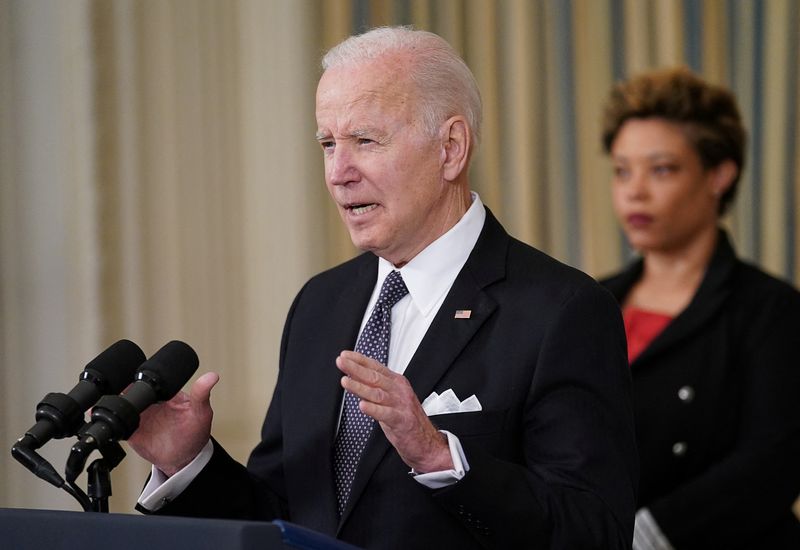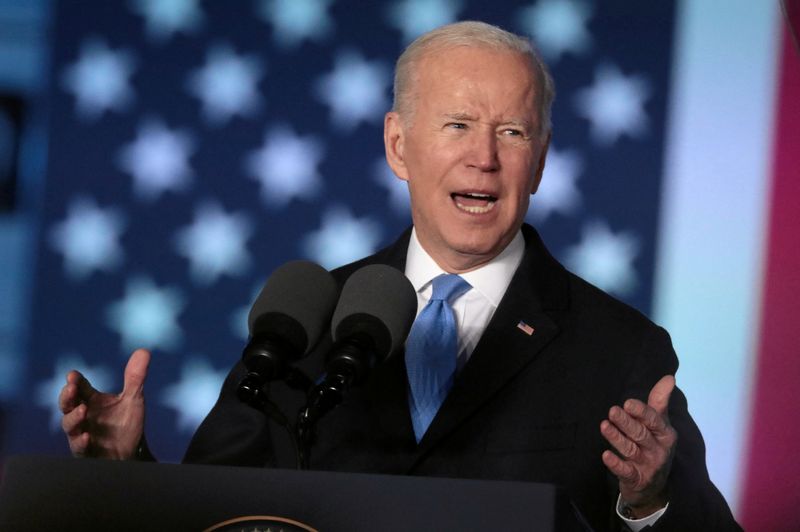By Andrea Shalal and Trevor Hunnicutt
WASHINGTON (Reuters) -U.S. President Joe Biden on Monday submitted a $5.79 trillion budget plan to Congress that calls for record peacetime military spending and further aid for Ukraine, while raising taxes for billionaires and companies and lowering government deficits.
The budget proposal for the fiscal year starting Oct. 1, lays out Biden's priorities, including campaign promises to make the wealthy and companies pay more tax. It is merely a wish list as lawmakers on Capitol Hill make the final decisions on budget matters.
House Speaker Nancy Pelosi said Congress looked forward to working on Biden's "bold fiscal blueprint," even as some fellow Democrats chafed at Biden's pledge to boost military spending. Biden's plan drew immediate criticism from Republicans, who together with moderate Democrats, killed similar tax proposals in the 2022 budget.
"The budget I am releasing today sends a clear message to the American people (about) what we value: first, fiscal responsibility, second, safety and security, and thirdly ... the investments needed to build a better America," Biden told reporters at the White House.
The Democratic president said he was calling for higher defense spending to strengthen the U.S. military and "forcefully respond to (Russian President Vladimir) Putin’s aggression against Ukraine" with $1 billion in additional U.S. support for Ukraine’s economic, humanitarian, and security needs.
The document, based on economic projections locked in before the war in Ukraine, offers fresh insight into Biden's thinking as he prepares for a Nov. 8 midterm election that could see his Democratic Party lose control of Congress.
Biden told reporters his administration is "making real headway cleaning up the fiscal mess I inherited", and will reduce the federal deficit by more than $1.3 trillion this year with $1 trillion in further cuts planned over the next decade.
“For most Americans the last few years were very hard, stretching them to the breaking point. But billionaires and large corporations got richer than ever," he said, adding, "That's not fair ... Just pay your fair share."
The U.S. federal government, on the hook for rising healthcare and social spending, especially for older Americans, has spent more money than it has taken in for each of the last 20 years.
'CONTENTIOUS' PROCESS
House Budget Committee Chairman John Yarmuth, a Democrat, predicted a "contentious" battle among Democrats over Biden's call for big hikes in the already mammoth U.S. military budget. Republicans said it didn't raise military spending enough.
With a razor-thin majority in the House, Yarmouth warned that Democrats could lose no more than three to five votes within the party and still pass a budget opposed by Republicans.
Yarmuth said the entire process could drag out again as it did last year, when Congress did not approve a budget until August, long after the House wrote its appropriations bills.
Lindsey Graham (NYSE:GHM), the top Republican on the Senate Budget Committee, said Biden's tax hikes would harm U.S. workers and the overall economy, while increasing deficits.
Under Biden's policies, deficits would fall to 5.8% of gross domestic product (GDP) this year and stay below 5% over the next decade. That compares to 14.9% of GDP in 2020, the last year of the Trump administration, the White House said.
The focus on deficit reduction reflected the concerns of Democratic Senator Joe Manchin, whose stated concerns over rising U.S. debt already thwarted passage of Biden's "Build Back Better" plan last year.
On the home front, Biden's plan boosts spending on policing, efforts to fight gun crime, and invests heavily in crime prevention, while adding some $50 billion to address the critical shortage of affordable housing.
The plan does not include line items for bolstering climate change, healthcare, education and manufacturing competitiveness that featured heavily in the "Build Back Better" bill.
Instead, it has a deficit-neutral reserve fund to allow lawmakers to negotiate those items, Shalanda Young, director of the Office of Management and Budget, said.
BILLIONAIRES' TAX
It introduces a new minimum tax requiring the very wealthy to pay at least 20% of their income in taxes, including on the gains on investments that have not been sold.
That tax would apply to 0.01% of American households - those worth over $100 million - with more than half of the new revenue coming from households worth more than $1 billion, the White House said. It would reduce the government deficit by $360 billion over the next decade.
The budget also targets U.S. corporate buybacks, requiring company executives to hold on to company shares that they receive for several years after a stock buyback.
It would raise the corporate tax rate to 28% while making changes to the corporate tax code to reward job creation and investment.

It calls for $773 billion for the Department of Defense, plus $40 billion for defense-related programs at the FBI, Department of Energy and other agencies.
Russia's Feb. 24 invasion of Ukraine has intensified concerns about European security, while the Biden administration continues to invest in research and development of hypersonic missiles and other modern capabilities.
